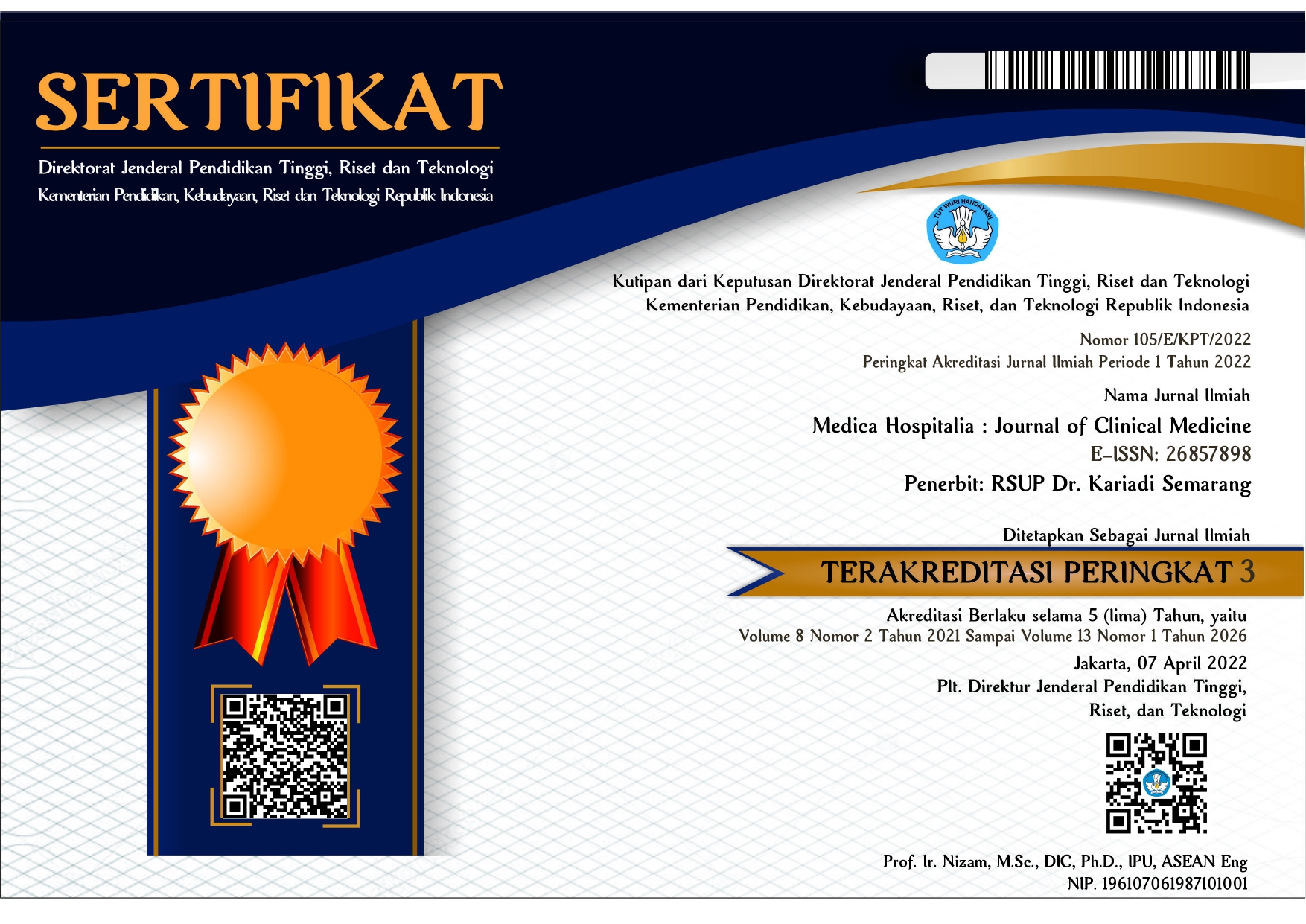Risk Factors for Peripheral Vertigo
DOI:
https://doi.org/10.36408/mhjcm.v11i2.977Keywords:
Peripheral vertigo, Risk factor, hypertensionAbstract
Background: Several risk factors influence the occurrence of peripheral vertigo, including advanced age, gender, and chronic metabolic diseases. This disease is not widely recorded in primary care due to the need for detection with simple examinations. Research on the association of several risk factors has yet to be reported.
Objectives: To examine the relationship between age, gender, type 2 diabetes mellitus (DM2), and hypertension as risk factors for peripheral vertigo.
Methods: This study is a case-control study that used consecutive sampling. The study sample consisted of 39 people: 19 in the case group and 20 in the control group. Data were obtained from 2 health centers and Diponegoro National Hospital, Semarang City. The data were obtained from history taking and physical examinations such as the Gans Sensory Organization Performance Test (SOP), past pointing test, and dysdiadokokinesia test. DM2 disease and hypertension were gathered from medical records. Data analysis used univariate analysis, bivariate analysis with chi-square, and logistic regression multivariate analysis.
Results: Statistical test results concluded that hypertension is a risk factor for peripheral vertigo (p = 0.008; OR = 6.964; 95%CI = 1.657 - 29.263). Whereas age, gender, and DM2 were not risk factors, with p-values of 0.187, 0.378, and 0.417, respectively.
Conclusion: The significant risk factor associated with the occurrence of peripheral vertigo was hypertension by 6.964 times.
Downloads
References
1. Lopes AR, Moreira MD, Trelha CS, De Moraes Marchiori LL. Association between complaints of dizziness and hypertension in non-institutionalized elders. Int Arch Otorhinolaryngol. 2013;17(2):157-162. Retrieved (https://doi:10.7162/S1809-97772013000200007)
2. Dhingra P, Dhingra S, Dhingra D. Diseases of Ear, Nose and Throat & Head and Neck Surgery. 7th ed. Elsevier; 2018. Retrieved (https://doi:10.5005/jp/books/12861_7)
3. Park MK, Lee DY, Kim YH. Risk factors for positional vertigo and the impact of vertigo on daily life: The Korean National Health and Nutrition Examination Survey. J Audiol Otol. 2019;23(1):8-14. Retrieved (https://doi:10.7874/jao.2018.00178)
4. Wada M, Takeshima T, Nakamura Y, et al. Incidence of dizziness and vertigo in Japanese primary care clinic patients with lifestyle-related diseases: An observational study. Int J Gen Med. 2015;8:149-154. Retrieved (https://doi:10.2147/IJGM.S82018)
5. Sutarni S, Malueka RG, Gofir A. Bunga Rampai Vertigo. Gadjah Mada University Press; 2018.
6. Gans R. Gans Sensory Organization Performance (SOP) Test. ENT Audiol News. 2011;20(1):1-8.
7. Teggi R, Manfrin M, Balzanelli C, et al. Point prevalence of vertigo and dizziness in a sample of 2672 subjects and correlation with headaches. Acta Otorhinolaryngol Ital. 2016;36(3):215-219. Retrieved (https://doi:10.14639/0392-100X-847)
8. D’Silva LJ, Staecker H, Lin J, et al. Retrospective data suggests that the higher prevalence of benign paroxysmal positional vertigo in individuals with type 2 diabetes is mediated by hypertension. J Vestib Res Equilib Orientat. 2016;25(5-6):233-239. Retrieved (https://doi:10.3233/VES-150563)
9. Jusuf MI, Wahidji VH. Bunga Rampai Kedokteran. (Jusuf MI, Wahidji VH, eds.). IDI Cabang Kota Gorontalo; 2014.
10. Li S, Wang Z, Liu Y, et al. Risk Factors for the Recurrence of Benign Paroxysmal Positional Vertigo: A Systematic Review and Meta-Analysis. Ear, Nose Throat J. 2020;(11). Retrieved (https://doi:10.1177/0145561320943362)
11. Zhu CT, Zhao XQ, Ju Y, Wang Y, Chen MM, Cui Y. Clinical Characteristics and Risk Factors for the Recurrence of Benign Paroxysmal Positional Vertigo. Front Neurol. 2019;10(November):1-6. Retrieved (https://doi:10.3389/fneur.2019.01190)
12. Hidayati S. Sistematic Review of Hypertention Risk Factors in Indonesia. J Heal Sci Prev. 2018;2(1):48-56.
13. Agrawal Y, Carey JP, Della Santina CC, Schubert MC, Minor LB. Disorders of Balance and Vestibular Function in US Adults. Arch Intern Med. 2009;169(10):938. Retrieved (https://doi:10.1001/archinternmed.2009.66)
14. De Stefano A, Dispenza F, Suarez H, et al. A multicenter observational study on the role of comorbidities in the recurrent episodes of benign paroxysmal positional vertigo. Auris Nasus Larynx. 2014;41(1):31-36. Retrieved (https://doi:10.1016/j.anl.2013.07.007)
15. Chen J, Zhao W, Yue X, Zhang P. Risk factors for the occurrence of benign paroxysmal positional vertigo: A systematic review and meta-analysis. Front Neurol. 2020;11(June):1-12. Retrieved (https://doi:10.3389/fneur.2020.00506)
16. Sfakianaki I, Binos P, Karkos P, Dimas GG, Psillas G. Risk factors for recurrence of benign paroxysmal positional vertigo. A clinical review. J Clin Med. 2021;10(19). Retrieved (https://doi:10.3390/jcm10194372)
17. Yang H, Gu H, Sun W, et al. Estradiol deficiency is a risk factor for idiopathic benign paroxysmal positional vertigo in postmenopausal female patients. Laryngoscope. 2018;128(4):948-953. Retrieved(http://doi:10.1002/lary.26628)
18. Kim M, Lee DS, Hong TH, Cho HJ. Risk factor of benign paroxysmal positional vertigo in trauma patients. Med (United States). 2018;97(49). Retrieved (https://doi:10.1097/MD.0000000000013150)
19. Cheema S, Maisonneuve P, Zirie M, et al. Risk factors for microvascular complications of diabetes in a high-risk middle east population. J Diabetes Res. 2018;2018. Retrieved (https://doi.org:10.1155/2018/8964027)
Additional Files
Published
How to Cite
Issue
Section
Citation Check
License
Copyright (c) 2024 Yuni Retno Sekarwangi, Dwi Marliyati, Kanti Yunika, Zulfikar Naftali (Author)

This work is licensed under a Creative Commons Attribution-ShareAlike 4.0 International License.
Copyrights Notice
Copyrights:
Researchers publishing manuscrips at Medica Hospitalis: Journal of Clinical Medicine agree with regulations as follow:
Copyrights of each article belong to researchers, and it is likewise the patent rights
Researchers admit that Medica Hospitalia: Journal of Clinical Medicine has the right of first publication
Researchers may submit manuscripts separately, manage non exclusive distribution of published manuscripts into other versions (such as: being sent to researchers’ institutional repository, publication in the books, etc), admitting that manuscripts have been firstly published at Medica Hospitalia: Journal of Clinical Medicine
License:
Medica Hospitalia: Journal of Clinical Medicine is disseminated based on provisions of Creative Common Attribution-Share Alike 4.0 Internasional It allows individuals to duplicate and disseminate manuscripts in any formats, to alter, compose and make derivatives of manuscripts for any purpose. You are not allowed to use manuscripts for commercial purposes. You should properly acknowledge, reference links, and state that alterations have been made. You can do so in proper ways, but it does not hint that the licensors support you or your usage.

























